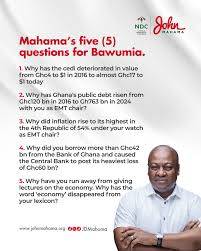Mahama's Five Questions for Bawumia: A Call for Accountability
Former President John Dramani Mahama has recently posed five critical questions to Vice President Dr. Mahamudu Bawumia, stirring discussions in Ghana’s political landscape. These questions, aimed at holding the current administration accountable, reflect broader concerns about governance, economic management, and social justice in the country.
1. **Economic Management**: Mahama's first question addresses the current state of the Ghanaian economy. He asks Bawumia to explain why, despite several promises to stabilize the economy, the country continues to face severe inflation and high debt levels. With many Ghanaians feeling the pinch of rising prices for basic goods and services, this question seeks clarity on the government's fiscal policies and their effectiveness. Mahama's challenge underscores a common sentiment among citizens who feel that economic management has not improved since the New Patriotic Party (NPP) came to power.
2. **Job Creation**: The second question focuses on employment opportunities. Mahama inquires about the specific measures the government has implemented to address the alarming unemployment rates, especially among the youth. With many young Ghanaians struggling to find meaningful work, this inquiry calls for transparency about job creation initiatives and their outcomes. It raises critical issues about the government's commitment to fostering a sustainable economic environment that supports job growth.
3. **Social Welfare Programs**: Mahama's third question tackles social welfare. He asks Bawumia how the government intends to enhance social safety nets for the most vulnerable populations. Given the economic hardships faced by many families, Mahama is pressing for details on government policies aimed at improving living conditions and supporting those in need. This question is particularly relevant in light of ongoing discussions about social equity and the distribution of resources in Ghana.
4. **Infrastructure Development**: The fourth question addresses the state of infrastructure in Ghana. Mahama challenges Bawumia to provide a clear plan for improving roads, healthcare facilities, and education systems. Infrastructure development is crucial for national progress, and Mahama’s inquiry seeks to ascertain the government’s commitment to building and maintaining critical infrastructure that can foster economic growth and improve citizens' quality of life.
5. **Corruption and Governance**: Lastly, Mahama questions the measures the government has taken to combat corruption within its ranks. This inquiry is particularly pertinent, given the increasing concerns about transparency and accountability in governance. Mahama emphasizes the importance of integrity in leadership and seeks assurance that the government is actively working to address corruption, which undermines public trust and hampers national development.
In posing these questions, Mahama is not merely seeking to challenge Bawumia but is also reflecting the concerns of many Ghanaians. His questions highlight the need for responsible governance and effective leadership in addressing the pressing issues facing the nation. As Ghana approaches upcoming elections, these inquiries will likely resonate with voters who are eager for answers and solutions.
In conclusion, Mahama’s five questions serve as a reminder of the importance of accountability in political leadership. They urge the current administration to engage with the populace transparently and proactively, ensuring that the government remains responsive to the needs and aspirations of its citizens. The answers to these questions could shape the political discourse leading up to the elections and influence the electorate's decision-making process.



